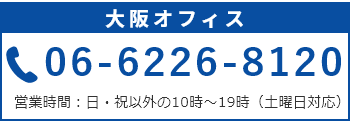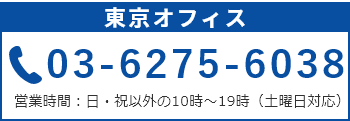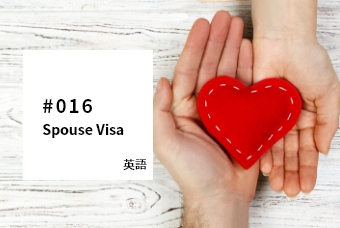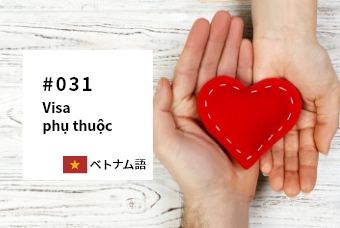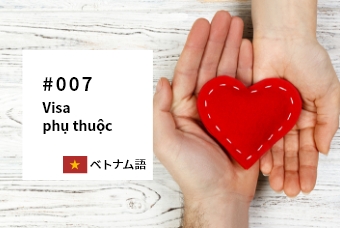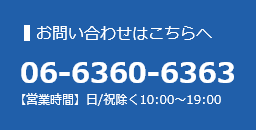【Case Study】How to call a Vietnamese wife to Japan by a dependent visa
Mr. A, a Vietnamese male, graduated from a vocational school in Japan and started to work as an engineer since April. Mr. A wants to call his wife in Vietnam to Japan as he got a job, but he cannot prepare an income taxation certificate or a taxation certificate to submit to the immigration office because it’s been not long enough since he started to work. Plus, Mr. A has a history of working part-time for more than the hours permitted by law when he was a student.
He came to us for free consultation as he was worried that he would not be able to get his wife to come to Japan and that his history of working more than permitted time may negatively affect the application for a dependent visa for his wife.
Index
1. What is a dependent visa?
The purpose of dependent visa is to accept dependents of the foreigners staying in Japan with a “status of residence which permits working (not including diplomat, official, specified skilled worker type 1, and technical intern training),” or status of residence of “cultural activities” or “student (not including some educational institutions such as Japanese language schools).” For example, if a husband works in a company in Japan with a work visa and supports his wife and child, the wife and child can come to Japan to live with him if they obtain dependent visas.
As described above, the purpose of the visa is to accept families who are “supported.” Accordingly, a person supporting dependents must have a status of residence which permits working (i.e. “professor,” “artist,” “religious activities,” “journalist,” “highly skilled professional,” “business manager,” “legal/accounting services,” “medical services,” “researcher,” “instructor,” “engineer/specialist in humanities/international services,” “intra-company transferee,” “nursing care,” “entertainer,” “skilled labor,” “specified skilled worker type 2,” “cultural activities,” and “student (falling under item (1) or (b) of the Criteria Ordinance)). In addition, those who are supported cannot work unless they obtain permission to engage in activity other than that permitted under the status of residence previously granted, which is a special characteristic of this visa.
Moreover, a “spouse” is limited to a person whose marriage is legally effective and does not include any ex-husband/wife, common-law husband/wife, and the same-sex spouse legally married abroad. A “child” includes a legitimate child, adopted child, and acknowledged illegitimate child, as well as an adult who is still supported by parents such as a student. Families other than a spouse and a child are not qualified for “dependent” visa.
2. Requirements for dependent visa
(i) A person supporting the dependent has a status of residence of any of the following:“professor,” “artist,” “religious activities,” “journalist,” “highly skilled professional,” “business manager,” “legal/accounting services,” “medical services,” “researcher,” “instructor,” “engineer/specialist in humanities/international services,” “intra-company transferee,” “nursing care,” “entertainer,” “skilled labor,” “specified skilled worker type 2,” “cultural activities,” and “student (falling under item (1) or (ii) of the Criteria Ordinance)”;
(iii) A person supporting the dependent has intension and ability to support; and
(iv) The supported spouse or child is actually supported or in the custody of and raised by the supporting person.
That’s all requirements for permission for a dependent visa.
Then let’s look at the case of Mr. A!
3. Procedures to call a Vietnamese wife by a dependent visa
Mr. A just got a job and cannot submit income taxation certificate or taxation certificate to the immigration office, so in this case, the ability to support in requirement (ii) above is especially an issue among all the requirements listed in 2 above. Also, Mr.A has worked more than legally permitted hours when he was a student, which is a problem. Now, we would like to examin how such history affects the application for permission for a dependent visa for his Vietnamese wife.
(1) How violation of law by the person supporting a dependent would affect visa application
A. Working more than legally permitted hours
First, the status of residence of student does not allow working, and working more than legally permitted hours is a clear violation of the permission to engage in activity other than that permitted under the status of residence previously granted (i.e. violation of the Immigration Act). When applying for extension of a student visa or for change to a work visa, such extension or change could be rejected based on such violation of law.
Please understand that consequently students could be forced to give up studying in Japan, or job offers may be canceled.
B. How working more than legally permitted hours may affect application for a dependent visa
Now, let’s find out how Mr. A should handle his history of working more than legally permitted hours in order to obtain a dependent visa for his Vietnamese wife.
Such history of illegal act will not be deleted, so Mr. A needs to explain how he ended up working more than legally permitted hours and to convince that such situation will never happen. It is important to indicate the reasons why Mr. A worked more than permitted time and how to prevent such situation from occurring again in a document.
(2) “Ability to support,” which is a requirement for permission for a dependent visa
Now, let’s verify Mr. A’s “ability to support.”
Assets, etc. of a person supporting a dependent which enables him/her to pay all of his/her expenses are regarded as ability to support. For example, savings made through working within the limit of permission to engage in activity other than that permitted under the status of residence previously granted (i.e. part-time job) by a person supporting the dependent are considered as a part of ability to support. Moreover, scholarship is possibly regarded as a part of ability to support; therefore, the certificate concerning scholarship which clearly describes the amount and period of scholarship payment will be a strong evidence to show ability to support.
Then, in order to prove ability to support, is it possible to use the savings made by working more than legally permitted hours?
First of all, working more than permitted hours is illegal and there are strict penalties for that. If income illegally made can be used to prove the ability to support, such conduct may lose its substance.
Hence, such money cannot be included in the assets demonstrating ability to support.
Consequently, the income Mr. A has gained through working more than legally permitted hours cannot be included in his assets. In this case, he needs to demonstrate his ability to support by showing income which has been made legally within permitted conditions, and other assets he has. Plus, if he had a scholarship, certificate of such scholarship also helps to prove ability to support.
As Mr. A has a factor as negative as the violation of the Immigration Act, it is not easy to obtain permission for a dependent visa for his wife. Having said that, it is also not reasonable to suspect his application based on his past deeds. This is pointed out in a precedent as well (Judgement of Tokyo district court dated 16 October 2009 “case of request for revocation of disposition of no-distribution of certificate of eligibility”).
Finally, Mr. A could receive a dependent visa for his wife by demonstrating above matters.
4. Summary of how to call a Vietnamese wife by a dependent visa
The main issues in the case above were 1) how violation of law by the person supporting the dependent would affect application for a visa, and 2) whether assets attained by illegal action may be counted as the ability to support, which is a requirement for permission for dependent visa.
We often have complex cases which seem difficult to settle, but we have led many cases to the solution by unraveling each case carefully.
The case above was one of them and other office thought it would be difficult to obtain a dependent visa.
If you are having a hard time as you cannot find a way to solve your problems, please feel free to contact us.



